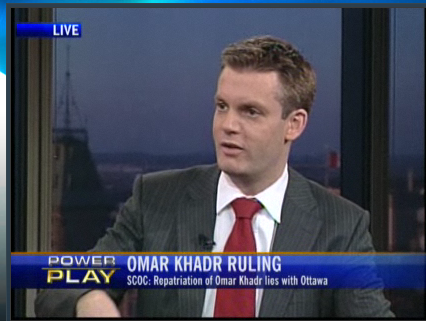On Friday, Kory Teneycke, a former top adviser to PM Stephen Harper, was interviewed on CTV’s Power Play about the Khadr decision:
Here’s a transcript of the best parts:
Aside from showcasing the Harper government’s ideological approach to human rights, Teneycke’s dialogue serves to remind us of the importance of the Charter with respect to individual rights. As eloquently stated by then-Chief Justice Dickson, the Charter safeguards minorities from the “tyranny of the majority” (R. v. Big M Drug Mart Ltd., [1985] S.C.J. No. 17 at para. 96).
I personally hope that most Canadians would prefer to see an alleged terrorist brought before our functional justice system, rather than lower our justice system to a terrorist-like level of disregard for human rights. But even if the Harper government, and the majority of Canadians, wouldn’t care to see Khadr treated as a human being, there is still Charter-based justification for the judiciary (and the “bleeding hearts in law school”) to seek protection of his fundamental rights.


I guess this Kory Teneycke guy’s never heard of the presumption of innocence, due process, or the Charter.
Someone call up Fox News, because this guy needs his own show. He’s perfect.
Signed,
A bleeding heart in law school.
Did the SC err in its judgment?
You do realize that given we’re the largest law school site in Canada, and we get heavy traffic from Conservative Party headquarters, so he’s probably referring (in part) to us?
Teneycke’s simple comment demonstrates a complete pre-judgment in the case. We haven’t had any certainty of a trial until very recently, and even now we’re not entirely sure what that will consist of. Due process always exists, and those claiming otherwise are also criminals. We should lock them up for a very long time too.
Teneycke probably never heard of these photos either:

Also signed,
A bleeding heart in law school.
“Borders are scratched across the hearts of men, by strangers with a calm, judicial pen, and when the borders bleed we watch with dread the lines of ink along the map turn redâ€Â Marya Mannes (American Writer, 1904-1990)
Sorry to press this, but I don’t understand the arguments here. Are you saying that the Court was wrong in its ruling, the Government is wrong in the use or failure to use their power, or both?
I don’t think whether or not Kory Teneycke is a jerk is at issue.
I think we can agree that we’d all rather have the Supreme Court make these kinds of decisions than Teneycke.
Marc, I’m not directly attacking the Court’s ruling here. That’s not within my intellectual capacity… yet. Although I would be inclined to agree with most of the opinions here. I just wanted to draw attention to Teneycke’s ridiculous comments, and make a rational argument against them.
Also, I think that Teneycke might be referring to more than just the students in law schools. I know offhand that UofT alone sent two professors as interveners (Sujit Choudry for the BCCLA, and Audrey Macklin for the IHRP & David Asper Centre at UofT), and Laval fielded the Groupe d’eÌtude en droits et liberteÌs de la FaculteÌ de droit de l’UniversiteÌ Laval. Teneyke’s comments could be part of a broader Conservative distrust of academia.
p.s. here’s a youtube link of the clip to show your friends:
…and another clip of Parliamentary Secretary to the Prime Minister, Pierre Poilievre, stating that the Court should have no bearing on the government’s decision to request repatriation:
(disclaimer: I am not “BleedingHeartLawyer”, although I am a bleeding heart in law school)
I tend to agree that Teneycke’s comments were ridiculous, or at least ridiculously over-dramatic. And, you may be right that conservatives tend to mistrust academia. But, I’m not sure if it’s fair to claims that anything that Teneycke says showcases Harper’s approach to human rights. Whether criticizing the government for their action/inaction in this case is legitimate or not is quite a different issue.
But, I would have to wonder that if the government’s decision was so overwhelmingly unjust, why the Supreme Court ruling go the other way. Either the system works the way it should or it doesn’t. And, if it doesn’t, it should change. So, if people want Khadr in Canada, how do they propose the system be changed?